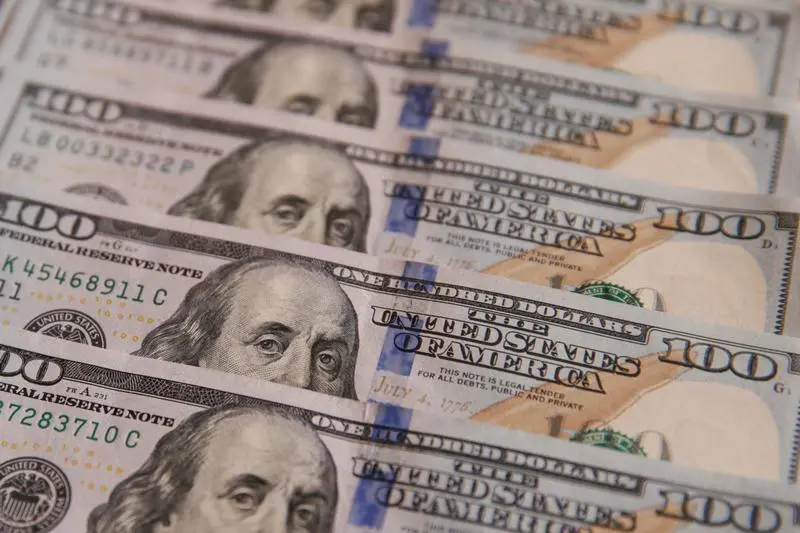PHOTO
LONDON - World stocks fell for a fifth straight session, the dollar hit its strongest since March and sterling and the Swiss franc tumbled on Thursday, as the latest crop of central bank interest rate moves continued to produce surprises.
The mood had already been "risk off" after the U.S. Federal Reserve had signalled that it probably had at least one more hike left in the relentless rate rise cycle it began early last year.
Dealers were then caught off guard by a lurch in the franc in Europe as Swiss National Bank unexpectedly held its rates steady, a move then repeated in Britain and sterling markets as the Bank of England followed suit.
While Sweden and Norway had both stuck to the script by hiking their rates as expected, the latter surprised too by signalling it could go again in December. It all made another jumbo hike in Turkey look like a model of predictability.
Wall Street looked set for another drop when it reopens and Saxo Bank analyst John Hardy said Europe's central bank moves showed there was now more uncertainty about both when and where interest rates max out.
"Different countries are in different gears so it is real data driven responses we are seeing now, especially for the UK," Hardy said following the BoE's decision, which had been its first pause after 14 consecutive hikes.
"It punctures the balloon on terminal rates and also creates more second guessing on the quality of the (economic) landings".
Sterling, which has been on the slide since July, dropped through $1.23 to as low as $1.2223.
UK inflation figures this week meant Goldman Sachs and other banks had ditched their previous calls for one more rate increase and investors had cut the chance of a pause to roughly 50%, up from just 20% before the data.
Not everyone did, and Tom Hopkins, a portfolio manager at BRI Wealth Management said it was "too early to rule out any further rate hikes this year."
For the bond markets that meant the search for the elusive peak in rates goes on.
Mirroring a rise in U.S. Treasury yields, Germany's 10-year government bond yield touched a fresh six-month high of 2.73% and Britain's 10-year gilt yield rose to 4.29% after falling on Wednesday to its lowest since July.
FED REACTION
Wall Street's restart is set to be driven by another likely fall in the rate-sensitive mega stocks such as Apple, Meta Platforms, Alphabet and Nvidia, most of which have been having a difficult month.
Overnight in Asia, MSCI's broadest index of Asia-Pacific shares outside Japan slumped 1.6% in what was its biggest move since early August. Japan's Nikkei fared only slightly better with a 1.4% loss.
With a crucial Bank of Japan meeting still to come this week, Japan's 10-year government bond yield rose to its highest in a decade.
Though the rise signals an expectation that the BOJ could finally move away from its easy money "yield curve control" policy, it was also tracking U.S. 10-year Treasury yields , which had risen to a 16-year high of 4.43% in the wake of the Fed.
Ben Luk, senior multi-asset strategist at State Street Global Markets said the overall tone of the Fed's meeting on Wednesday, while not overly hawkish, included two surprises.
Forecasts for 2024 were slightly higher than generally expected and its comments implied that U.S. growth would hold up even if rates stay higher for quite a while.
The median forecast for the federal funds rate is 5.1% by year-end, up from 4.6% estimated in June.
The dollar index, which measures it against a basket of currencies, rose as high as 105.59 on Thursday, its strongest since March 9, pushing the yen close to its weakest since November.
Europe's stock market drop and the expectations of Wall Street doing so too meant MSCI's benchmark world stocks index was firmly on course for a fifth day in the red, which will be its longest losing streak since March.
Commodity bulls were backing off too. Oil prices, which have been on a tear since Saudi Arabia and Russia agreed to crimp their production recently, posted their largest fall in a month.
Brent crude fell as much 1.3% before settling at $93 per barrel and U.S. crude dropped as far as $88.37 before clawing back to just above $89 . Gold was also slightly lower at $1,918.96 an ounce.
(Additional reporting by Xie Yu in Hong Kong Editing by Shri Navaratnam and Tomasz Janowski)




















